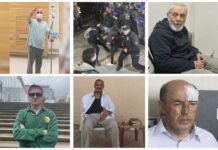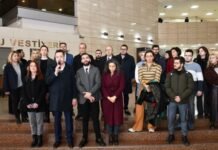Muhammed Savaş Bayındır, a former academic in the law faculty at Ankara’s Gazi University, in a public letter said he was brutally tortured at the Ankara Police Department after being detained in a post-coup purge.
In the letter published by Bold Medya, Bayındır said he was detained on July 20, 2016 and taken to a sports hall that was used by the counterterrorism branch of the police. He recalled many other men like him waiting with their hands tied behind their backs standing facing the wall.
He later learned that most of the detainees were military officers.
Bayındır was also made to wait all night in that situation and said police officers insulted them and did not give them food or water. He added that the police had masks and that their faces were not visible.
In the morning Bayındır was ordered to strip naked and was handed an orange uniform. He was then told to kneel and wait for hours in that position. All the time the detainees were made to listen to speeches of Turkish President Recep Tayyip Erdoğan, which were broadcast on a loudspeaker.
“I remember the smell of blood and sweat in the hall,” he said. “I could see blood stains on the walls. The military officers were the worst off, as they were constantly beaten, insulted and humiliated. Some had broken jaws; others had broken arms or other limbs.”
Bayındır said they were regularly made to stand up and shout out profanities about themselves. He said they were threatened to give up information on their colleagues and the rector.
He said he was taken to a filthy back room where he was beaten with a baton. Bayındır recalled he was sprayed with water, stripped and further beaten. “In addition to the physical pain, I felt extremely humiliated,” he said.
“For fifteen days we were kicked, slapped and insulted,” he said. “We were beaten until we passed out.”
Bayındır added that they slept on the bare floor and the lights were constantly on. He explained that sometimes police officers would come during the night and randomly start shouting to wake them up. “Whatever sleep we could have on the freezing cold floor was disrupted by the shouting,” he said.
The detainees were only given 50 grams of bread and 20 grams of cheese two times a day. After a while Bayındır started experiencing nausea and dizziness from a lack of nutrition. By the end of the 28 days of detention Bayındır had lost 15 kilograms.
“My wife said she could barely recognize me at the courthouse,” he said.
After nearly a month in detention Bayındır was taken to a basement room for questioning, where police officers forced him to sign a false statement. When he was eventually taken to the prosecutor’s office, the situation was no different as the prosecutor dismissed his claims of torture.
Bayındır said he was trying to forget what happened in detention but that he could never forget the screams of the tortured.
After a month in detention Bayındır appeared in court and was arrested for links to the Gülen movement. He was accused of sending his children to a private school affiliated with the movement. Bayındır was sent to Ankara’s Sincan Prison, where he was kept for 19 months.
Bayındır was eventually acquitted of all charges and moved to the United States with his family a year ago.
President Erdoğan has been targeting followers of the Gülen movement, a faith-based group inspired by Turkish cleric Fethullah Gülen, since the corruption investigations of December 17-25, 2013, which implicated then-prime minister Erdoğan, his family members and his inner circle.
Dismissing the investigations as a Gülenist coup and conspiracy against his government, Erdoğan designated the movement as a terrorist organization and began to target its members. He intensified the crackdown on the movement following a coup attempt on July 15, 2016 that he accused Gülen of masterminding. Gülen and the movement strongly deny involvement in the abortive putsch or any terrorist activity.
A total of 319,587 people have been detained and 99,962 arrested in operations against supporters of the Gülen movement since the coup attempt, Turkey’s Interior Minister Süleyman Soylu said in November.
After the abortive putsch, ill-treatment and torture became widespread and systematic in Turkish detention centers. Lack of condemnation from higher officials and a readiness to cover up allegations rather than investigate them have resulted in widespread impunity for the security forces.















